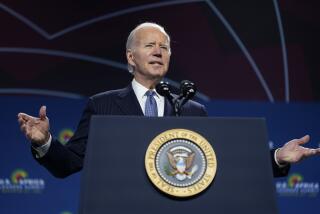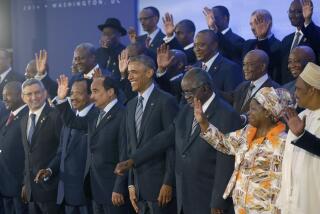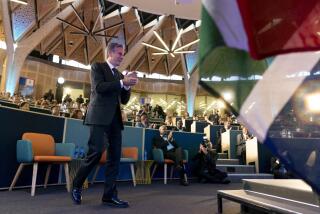Shultz Urges Africa to Reject ‘Failed Orthodoxies’ of Socialism
WASHINGTON — Africa must abandon the “failed orthodoxies” of socialism and move toward free markets, individual enterprise and foreign private investment if it hopes to escape from poverty and famine, Secretary of State George P. Shultz said Tuesday.
He said that past foreign aid efforts have often made Africa’s problems worse by increasing dependence on governmental programs.
Shultz made his comments in a speech prepared for a special United Nations session on Africa--the first in U.N. history to focus on the problems of one continent.
Increased Aid Promised
The secretary promised increased U.S. aid for African nations that restructure their economies to emphasize private enterprise. However, he offered no encouragement for a proposal by the Organization of African Unity for a $128.1-billion, five-year development program.
Other officials said the United States will be unable, because of its own budgetary difficulties, to agree to the aid levels requested by the Africans.
President Abdou Diouf of Senegal, chairman of the African organization, addressed the U.N. conference Tuesday at its opening. He urged the world’s nations to “reject ideological quarrels” and concentrate on the survival of the drought-plagued African economy.
Focus on Ideology
Shultz is scheduled to address the conference today, but the State Department made public his prepared text Tuesday night. The secretary, ignoring Diouf’s call to shun politics, concentrated on the ideological divisions between capitalism and socialism.
“The United States firmly believes that our own development experience is a useful guide to productive economic policies,” he said. “Today, many countries are reawakening to the fundamental connection between individual initiative and economic progress.
“Even Communist nations are awakening to the fact that individual initiative, not state direction, is the source of growth,” Shultz said. “This special session provides an opportunity for all of Africa to join in what is a worldwide movement by rejecting failed orthodoxies and giving greater scope to individual initiative.”
Billions Sought
The Africans’ proposal, approved in principle by a special U.N. committee, calls for African nations themselves to generate $82.5 billion of the $128.1-billion needed for development by 1990. It urges the world’s affluent countries to supply $45.6 billion, an average of $9.1 billion a year.
The blueprint makes no attempt to divide up the quota among donor countries. But the United States usually contributes at least a quarter of the cost of most U.N. programs.
Shultz said U.S. assistance has already increased by more than 50% since the Reagan Administration took office in 1981. But he held out little hope for additional increases except for countries that move toward free market economies.
More to Read
Sign up for Essential California
The most important California stories and recommendations in your inbox every morning.
You may occasionally receive promotional content from the Los Angeles Times.










